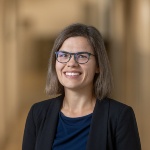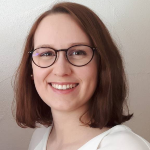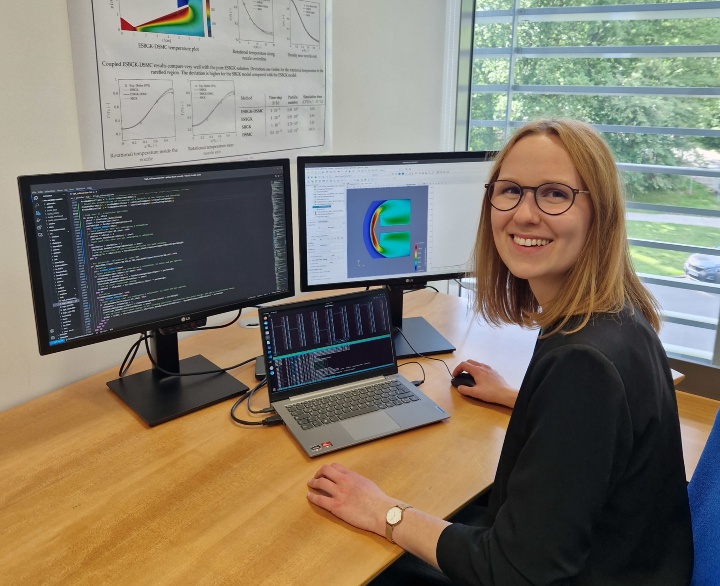Based on her doctoral study program, Franziska Hild has been awarded an Amelia Earhart Fellowship for pioneering achievements in the aerospace sciences, which is endowed with 10,000 US dollars. Hild, a Doctoral Researcher at the University of Stuttgart's Institute of Space Systems, impressed the jury with her research into the simulation of dynamic gas flows around satellites and re-entry capsules.
"Being an Amelia Earhart Fellow is quite a big deal," says Franziska Hild, who was presented with the award on February 21, 2024 at a ceremony hosted by the Zonta Club Stuttgart, "one really doesn't expect it, although there have always been female award winners at the University of Stuttgart.” She is pleased that the prize not only recognizes her research, but also that it offers excellent opportunities for networking and of course the prize money is not to be sneezed at.
Exciting simulations on the laptop
It is the exciting moment when the computer has completed its work and all of Hild's formulas take shape on the screen in the form of a simulation. That's when the scientist is able to see such things as the flow resistance of a satellite or the temperature development on the surface of a capsule as it re-enters the Earth's atmosphere. "I'm not one for standing in the lab, tinkering and testing," says Hild. The doctoral student uses mathematical methods to investigate the behavior of gases on her laptop. "It is really exciting to research theoretical principles and develop new methods from them," says Hild, who had already been smitten by math, physics, and chemistry at school. She found the perfect course of study at the University of Stuttgart in the field of aerospace engineering, which combines her interest in astronomy and engineering.
Gas mixtures and their behavior
Hild studies gas mixtures and their behavior in order to understand their interactions with satellites in orbit around the Earth or with space capsules re-entering the atmosphere. "For example," she explains, "it is extremely important to know how much heat is generated on the surface of the capsule during re-entry so that appropriate heat shields can be developed.” By contrast, the resistance generated by the surface of satellites in low Earth orbits is particularly interesting, because the lower the resistance, the longer they are likely to remain in orbit.
One can expect to see more rarefied gas mixtures at high atmospheric altitudes, which become denser as they come closer to the Earth. The standard method for simulating rarefied gas mixtures is the so-called Direct Simulation Monte Carlo method (DSMC method) whereas computational fluid dynamics (CFD) is used to calculate flows in denser gas mixtures. "The new method I’m using is known as the Bhatnagar-Gross-Krook method (BGK),” Hild explains, pointing out its advantages: it can also be applied to the transition zone between rarefied and denser gas mixtures and requires less computing time for the simulation of denser gases than the DSMC method. This transition zone is of particular interest during space capsule re-entry, for example, because the gas layer in front of the object becomes denser, whilst there are hardly any gas particles in its wake. The simulation tracks the movement of individual gas particles and calculates their interactions with the spacecraft, which enables conclusions to be drawn about the conditions both within the gas and on the surface of the spacecraft.
New challenges every day
Doctoral researcher Franziska Hild, one of the recipients of this year's Amelia Earhart Fellowship, is virtually a lone wolf worldwide in terms of the research she is carrying out and she is faced with new challenges every day. Yet she feels she is in good hands in her group at the University of Stuttgart's Institute of Space Systems. "Whilst we're not all working on the same topic within the group,” she says, “we're all working on the same code and can readily exchange ideas," noting that the program she is working on is open source: anyone is welcome to contribute at any time.
Former Amelia Earhart Prize winners at the University of Stuttgart:
Expert Contact:
Franziska Hild, University of Stuttgart, Institute of Space Systems, Phone: +49 711 685-62051, email

Lydia Lehmann
Deputy Head of University Communications

Franziska Tuttas
M.Sc.Research Associate


